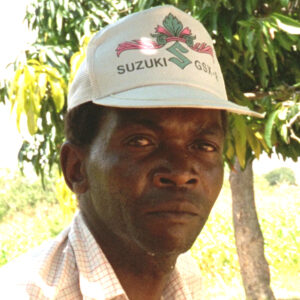Introduction
Sample ‘Sam’ Chigumbu is an excellent mbira player and singer in Seke Communal Area born in 1953. Though little known internationally, as a young man he played with famous musicians including Hakurotwi Mude and Thomas ‘Sekuru Gora’ Wadarwa. He was also one of international performer Stella Chiweshe’s mbira teachers.
Recordings Available From MBIRA
Sam Chigumbu’s 4 albums are available here – listen to audio samples!
Biography
(based on an interview and biography by Denver Banda in 2004, edited and updated by Erica Azim)
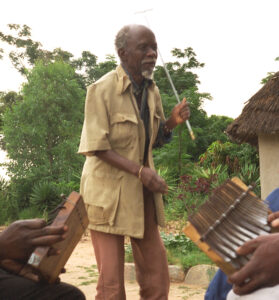
Learning to play mbira
Sample Chigumbu’s story of learning to play mbira is very cultural. When Sam was a child, his brother Stanley (age 23) became seriously ill, and both Western-trained doctors and traditional healers failed to cure him. Suddenly, Stanley requested a mbira from his father. His father was able to get one and gave it to his son, who started to play traditional songs with no instruction. His parents later found out that Stanley was the medium of an ancient spirit, and the mbira had healed him.
When 10-year old Sam got home from the fields, he began playing the song Nyamaropa, also without instruction. Realizing Sam’s talent, his father bought a second mbira for Sam.
Sam gradually learned more mbira songs from his dreams and from his brother, who also had dreams of mbira songs. His favorite song is Chipembere, because it brings spirits quickly (note: Sam calls several songs Chipembere, that are called other names by other musicians).
Spreading mbira
Soon the Chigumbu homestead was a hive of activity, as many people who loved mbira came to learn from Sam and his brother. There were few mbira players in Seke Communal Area at that time, and Sam had a significant impact spreading the music.
The mbira tuning that the Chigumbu family uses is called Mande, a version of nyamaropa tuning that Sam says is common in the Seke area.
Playing mbira in ceremonies
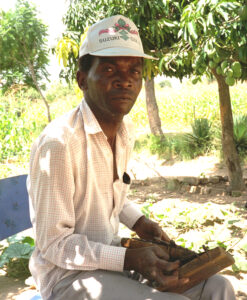
Sample played for his first bira ceremony during his first year playing mbira, delighting the elder members of the community. Within two years, he went on to play his first bira at the important spiritual location Chitungwiza (this is not the modern city of Chitungwiza). Chigumbu impressed older mbira players with his mature approach to the music, and being the youngest made him notable.
Proclamation as a gwenyambira came when Sam played at several 3-day ceremonies, each time bringing the spirits being called with relative ease. Sam was using a style combining kushaura and kutsinhira, which gave the music a deep richness.
When his mother died in 1967, Chigumbu’s father advised him to marry young and go to work in Harare (then Salisbury), which he did. He played mbira at ceremonies during the weekends, which connected him to more mbira players he ended up playing with, including Mude and Wadarwa.
Unfortunately, he got tuberculosis and was hospitalized for 16 months. During that time he taught nurses, orderlies and general staff at the hospital to play mbira!
Mbira singing
Singing passionately, Chigumbu uses the huro and kudeketera styles extensively. In addition to traditional lyrics, he adds lyrics based on the twists and turns of his own life experiences. Adding lyrics in this way is part of the Shona vocal mbira tradition.
Other musical skills
Chigumbu also learned at one time to play the munyonga type of mbira. He can build both mbiras and marimbas.
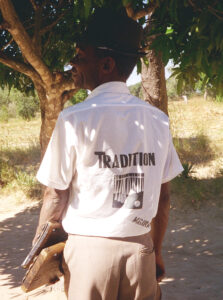 Recording in Zimbabwe
Recording in Zimbabwe
In addition to his recordings made by MBIRA, Chigumbu recorded a commercial album, ‘Ndongosienda’, in 1996 with his Tradition Mbira Group, now available here. However, this was frustrating at the time because the radio DJs required bribes to play the album on the air.
Mbira in Modern Times
Sam noted that in Seke Communal Area the locals mixed the new traditions and the old. They would follow their Shona customs the whole week and then go to church on Sundays. The balance that was maintained ensured the harmony of the two systems.
Chigumbu says,
“Mbira is our way of communicating. If you look at its intrinsic value, you will find life in it. Many of those who follow ‘modern life’ still seek us out privately to play at their ceremonies.”
Family Life
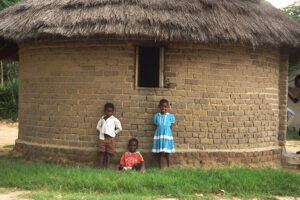
Chigumbu has 5 sons and 3 daughters with his first wife, who died in 2002. He has remarried and has one son with his second wife. Some of his children learned to play mbira and build instruments.
As well as his mbira activities, Chigumbu is an accomplished bricklayer/builder.
